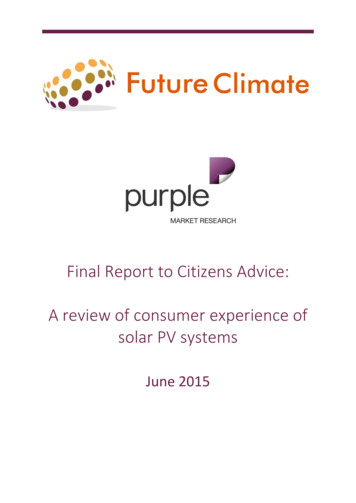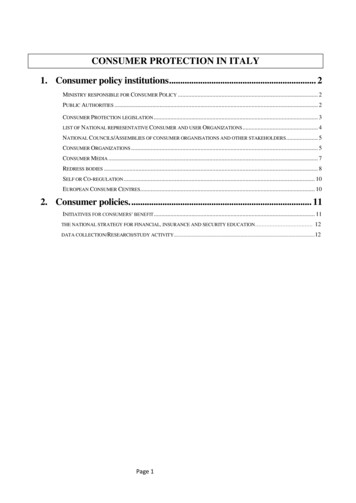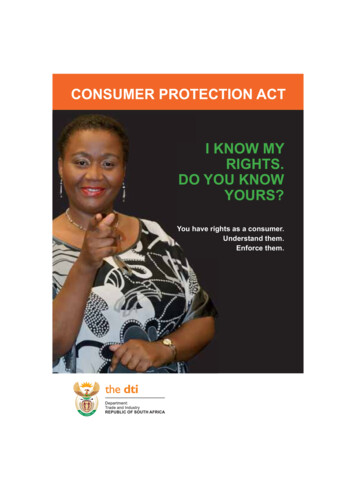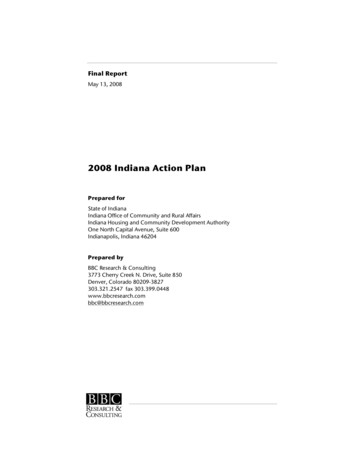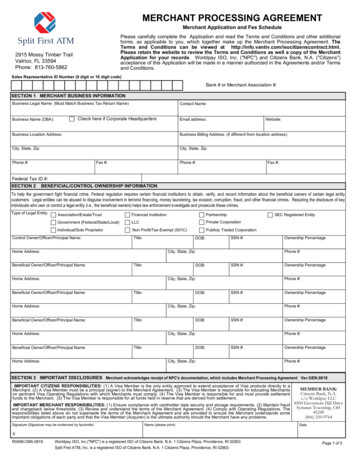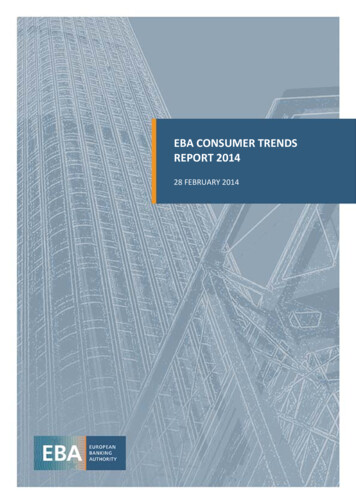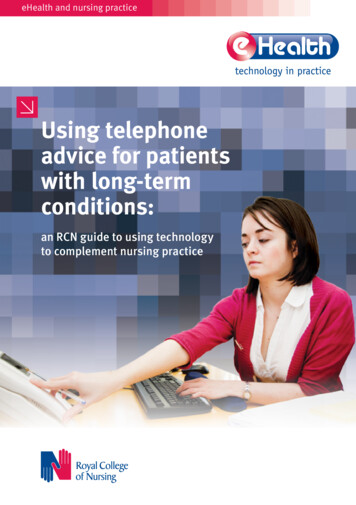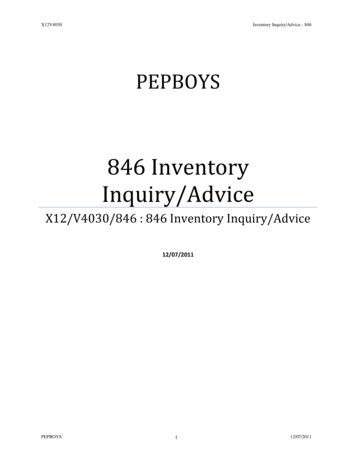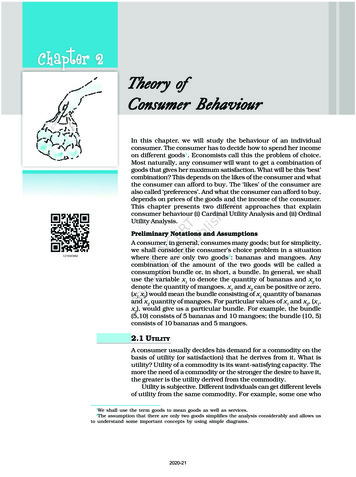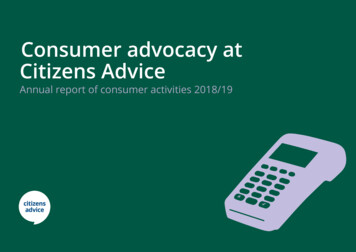
Transcription
Consumer advocacy atCitizens AdviceAnnual report of consumer activities 2018/19
ForewordAs a consumer advocate, Citizens Advice is an independent voicefor people in essential markets - people who otherwise struggleto be heard.We play a unique role in advice – helping millions of people find away forward each year. This helps us understand the problemspeople experience, so we can use that insight to shape debatesand change decisions in favour of consumers.The last year shows the impact we can have. An extra 11 million people have had their energy pricescapped, saving consumers a further 1bn Our loyalty penalty research revealed that 8 in 10 bill payersare being charged higher prices for remaining with theirexisting supplier. This led to action from the competitionwatchdog and government In post we’ve improved accessibility, most notably over thelast year for disabled and homeless peopleBeyond the headlines, we fight for consumers behind the scenes.These processes are technical and change is often incremental.While companies fight for their interests we fight for no-one butthe consumer, with an unparalleled level of expertise.Many of these debates rage on, and previous achievementsmust be maintained and protections extended. Markets arechanging fast, driven by new capabilities like big data. As theregulatory framework adapts, we are adapting the way we workas an advocate too, drawing increasingly on digital innovationsas a way to solve problems.Finally, while looking to the future, I am proud that thegovernment has recognised the vital role of a consumeradvocate by announcing a new champion for the telecomssector - something we have long called for to furtherstrengthen the voice of consumers.James PlunkettExecutive Director of Advice & Advocacy
Our year in numbers11 million people 1.4 millionprotected by the energy price capthe amount loyal consumers are losingevery day through the loyalty penalty 1 billionsaved from their bills per year 1,100the minimum additionalcosts for consumers whostruggle with a mentalhealth condition35,000parcel pick up and drop off pointsmapped by Citizens Advice 26 226saved perhouseholdwith differentsurnames onmailredirectioncostsbank branches visited bylocal offices to learn aboutaccess to services forhomeless people 6 billionEstimated yearly saving for consumersfrom lower cost of capital for energynetworks in the next price control3
How our advice and advocacy rolessupport each otherStatutory roleNon-statutory roleOur Consumer Service gives advice on allconsumer issues, with specialist advice onenergy and post issues.Policy and AdvocacyAdvice provisionConsumerserviceOther adviceprojectsEnergy policyEHULCAsPost policyThe Extra Help Unit (EHU) is a specialistsupport service for vulnerable consumers.For more information, see page 17).Our local Citizens Advice offices (LCAs)provide face-to-face advice on a range ofissues in approximately 2,300 locationsacross England and Wales.Cross sectorconsumerpolicySocial policyOur policy and advocacy work givesus insight into the organisations andsystems consumers deal with andinto the emerging risks forconsumers.This helps us provide advice andsupport that is up-to-date andeffective.Our advice provision gives us uniqueinsights into the problems peopleface, with real-time data.We use this to advocate forevidence-based policy changes thatdeliver the biggest improvements inoutcomes for consumers.4
Ten key projectsIn our energy, post and cross-sector consumeradvocacy 2018/19
Securing an energy price capRising energy bills have been akey concern for consumers fora number of years, sparkingdebate over what is a fair pricefor energy.The Competition and Markets Authority(CMA) investigation in 2016 foundhouseholds were paying an average of 1.4bn a year more than they wouldhave if the market was functioning well.As of 2018, more than half ofhouseholds remained on so-calledstandard variable tariffs (SVTs), payingan average of 320 a year more thanthe cheapest tariff in the market.2015-16: Our work on energy tariffs forvulnerable consumers influenced the CMAinvestigation and its recommendations.Spring 2017: In response to the CMAfindings, we made the case for a defaultprice cap in the run up to the 2017 generalelection.Spring 2018: We provided informalbriefings and written and verbal evidenceto the Bill Committee on the right pricecap design.Winter 2018: We engaged with regulatorson the price cap methodology: keeping inclose contact and responding to a range ofconsultations on scheme designIn 2019/20 our focus continues onshaping the debate on what the futureenergy retail market should look like.June 2016: CMA delivers final energymarket investigation remedies, whichincludes a prepayment meter price cap.June 2017: General election - bothConservative and Labour make manifestopledges for a default price cap.July 2018: Price cap legislation receivedRoyal Assent.1 January 2019: Price cap introducedEvery electricity and gas customer on adefault tariff had their price capped.Ofgem estimates this will saveconsumers around 1bn a year.May 2019: Ofgem consults on frameworkfor assessing when to lift the cap.6
Improving energy supplierperformanceEnergy is an essential for life service. Regulation must holdenergy suppliers to high standards on how to treat consumers.Unfortunately, energy suppliers sometimes fall short.Since the start of 2018, over 10 domestic energy suppliers haveexited the market, with their customers transferring to otherproviders. This process has frequently created problems. Whensuch issues occur, consumers turn to us for help. We also usethese insights to act to improve supplier performance. In2018/19 we:contributed evidence to Ofgem enforcement cases, leading toprovisional orders preventing ongoing detriment to consumersthrough the Consumer Service and Extra Help Unit, identifiedboth individual supplier and industry-wide issues and workedwith companies to improve their policies and processesprovided quarterly reporting through our star rating on wheresuppliers failed to meet decent standards of customer servicepublished good practice guides for suppliers on a range oftopical issuesIn 2019/20 this work will continue. We will focus on: making sure new supplier licensing rules introducetougher entry checks to ensure energy suppliers areprepared to deliver positive outcomes for consumersconsulting on updates to the star rating methodology tokeep it as up-to date as possibleHow our advice and advocacy roles support each other:The energy supplier star ratingOur evidence showed consumers missing out onsavings because they were worried about customerservice if they switched supplier.Using our knowledge of the energy market andconsumers we built our rating of supplier customerservice to help consumers when choosing a supplier.In response to rising numbers of small suppliers, weexpanded the star rating to include all suppliers withmore than 25,000 customer accounts.We used our statutory powers to request data fromsuppliers, allowing us to extend the ranking tosmaller suppliers.“My local office uses it with clients it reallyimproves client confidence when it comes toswitching energy supplier.” - local advisor7
Making mail redirections fairer and moreaffordablePeople moving house in the UK can payRoyal Mail an upfront fee to have theirpost forwarded to their new address, andin doing so avoid the risks of not receivingimportant mail. However, we found:A 74% increase in the cost of thecheapest redirections service, risingsix times faster than stamp pricesover the same period.Because Royal Mail is the monopolyprovider of mail redirections, if peoplecannot afford it they have nowhere else toturn.The redirections service was alsopreviously charged on a ‘per surname’basis. This unfairly penalised people innon-traditional family households - such ascohabiting couples, lone parent families orblended families - simply because theydon’t share a last name.We want to ensure the cost ofmail redirections is genuinely fairand affordable for everyone.In August 2018 we published a report,calling on Royal Mail to improve theirredirections service by:changing the cost from a per surnameto a per household basisoffering consumers the option of payingin monthly installmentsexploring concessionary rates forconsumers on the lowest incomesWe also recommended that Ofcom includeredirections in their review of theaffordability of universal postal services.As a result Royal Mail:Agreed to change the cost of mailredirections from a per surnamebasis to a per household basis.Agreed to a 20% concession forrenters in receipt of either PensionCredit or Jobseekers Allowance.While the concession scheme is notsufficient to ensure the service isgenuinely affordable for all, it is awelcome first step.We will continue to advocate for theoption to pay redirection fees inquarterly installments and for anexpanded concession scheme.The report started a productive series ofconversations with Royal Mail.8
Improving the accessibility of postal servicesfor disabled consumersOur research in 2017/18 showed thataccessibility is patchy across the postoffice networkWe found that accessibility varies acrossthe post office network. Despite someexamples of good practice, such as staffinteraction, provision of facilities can oftenbe inconsistent.In 44% of visits, shoppers withcompatible hearing aids were not ableto use a hearing loop.We also found there was insufficientinformation about accessibility on the postoffice website, making it harder forconsumers to plan their journey.In 2018/19 we published a report andmade 2 recommendations to PostOffice Limited (POL):Update the branch accessibilityinformation available on their websiteand link to it on their branch finderpage. In future, embed this informationinto the branch finder.Put in place an audit process tomonitor the accessibility of theirbranches. This should include regularin person visits to branches and amechanism for feeding back whereaction needs to be taken.By sharing our evidence and havingregular discussions with POL and otherkey stakeholders, we were able to securea commitment from POL to implementingour recommendations.Our advocacy work securedsignificant improvements to postoffice accessibilityPost Office Limited have:updated the accessibilityinformation on their website andare looking at how that can bemade easier to accessput in place a structure that willensure every branch is visited atleast twice each year, anaccessibility assessment will takeplace at every visit. When branchesaren’t meeting their accessibilityrequirements, action will be taken.In 2019/20 we will continue to check inwith POL on how this new process isworking and monitor improvements to theaccessibility of the network.9
A fairer deal from energynetworksOf an average 1,137 householdenergy bill,network costsaccount for:25%In 2017 we published a landmarkreport that showed regulatedmonopolies in the energy sector areovercharging consumers by 7.5billion in the current price control.It built on previous work highlightingthe need for better energy networkregulation.We’re working with Ofgem to make sureconsumers see significant savingsthrough the RIIO-2 price controlprocess.Our April 2018 report The postcodelottery in energy profits showed theregional differences in how muchconsumers are being overcharged byelectricity distribution firms.Our June 2018 report Things can only getbeta made the case for a fairer equity betarange for the price control.In a blog in August we set out 5 principlesfor the new price control, to ensure theprice controls delivered good service aswell as fair prices.We have made sure these principles arereflected in the RIIO-2 through: bilaterals with the regulator andnetworks engaging with weekly workgroupsdeveloping the RIIO-2 framework participating in Ofgem's ChallengeGroup, set up specifically to scrutiniseenergy network costs sitting on energy network challengegroups our reports, blogs and media workThe current price control RIIO-1, ends in2021 for the national energy networks andlocal gas grids, and 2023 for ElectricityDistribution networks. The RIIO-2settlement is now being agreed.Ofgem indicated early in2018/19 that network companyreturns would likely be lowerin RIIO-2 than RIIO-1They have reduced the level of returnsso it is more in line with the levels thatwould be expected by the market for anon-monopoly company. The latestestimates suggesting 6 billion will becut from the cost of capital.Our work also helped lead toimprovements in the RIIO-2 on: provisions for people in vulnerablecircumstances action by networks to limit thecarbon and environmental impact oftheir work10
The loyalty penaltyAcross essential services, people are being penalised for theirloyalty - from mobile and broadband, to financial services.Huge numbers of customers are on uncompetitive deals, payingfar more for a service than a new customer would. Our aim wasto find out how much this 'loyalty penalty' was and make surefirms stamp out this bad practice, At the time of thesuper-complaint, we estimated the loyalty penalty cost people 4.1bn per year.Our research found the loyalty penalty is widespread:8 in 10 bill payers are being charged significantly higherprices for remaining with their existing supplier in at leastone essential market, costing consumers several billionpounds a year.Customers don’t realise they’re being penalised for their loyalty,and face obstacles when trying to shop around. Depending onthe market:Up to 64% of consumers didn’t know that loyal customersare charged either the same or more than newercustomers.Customers in vulnerable situations are disproportionately stungby the penalty.April 2017: We published research exploring the loyaltypenalty in four markets: Broadband, Mortgage,Insurance, Phone handsets.September 2018: We submitted a Super-Complaint to theCompetition and Markets Authority (CMA).September 2018: Ofcom published a consultation outliningproposals to end the mobile handset loyalty penalty, whereconsumers are charged for a handset they already own.December 2018: CMA responded to the super-complaint and agreed that not enough has been done to tackle theloyalty penalty.February 2019: The Chair of the CMA wrote to theSecretary of State setting out proposals for the CMA to begiven strengthened powers to intervene for consumersMarch 2019: The FCA released its mortgage study findings.This said it would help 'mortgage prisoners' to move ontobetter deals.June 2019: The government announces new powers forregulators to fine companies ripping off loyal customers.11
Personalised pricingPrice discrimination is a well establishedfeature of markets and can deliver lowerprices for many consumers.But technological change is making it moreprevalent, more intense — and morepersonalised. More personal data aboutus is being produced than ever before —for example, by 2020, the government’starget is that 53 million smart meters in UKhomes will be generating unparalleledlevels of data about our energy use.We wanted to learn more aboutpersonalised pricing, so we partnered withan economics consultancy to investigatethe presence of personalised pricing in 4essential markets:EnergyWaterTelecomsPostIn May 2018, we collaborated with theCMA to present our findings to a widergroup of stakeholders. Building uponthese discussions, we shared our findingsthrough a report, published in August.We found that personalised pricing is notyet widespread in regulated markets. Atthe moment, providers don’t have thenecessary data, and haven’t invested inmanipulating it.But we also modelled the contexts inwhich personalised pricing might pose thebiggest risk. We found that:Personalised pricing is much morelikely in the energy and telecomssectors, where more data isavailable and customers can moreeasily be segmented by particularbehaviours - such as reluctance toswitch.Our report has received widespreadrecognition, and has contributed to anemerging field of research, including thatundertaken by the government’s DigitalCompetition Expert Panel.The FCA has subsequently undertaken itsown research into price discrimination. Itproposed in the general insurance market,personalised pricing might rely onprotected characteristics data which wouldconstitute discrimination under theEqualities Act.12
Better access to postal services forhomeless peopleUnderstanding the problemThis year we wanted to understand theimpact on homeless people of having noaddress or access to post.We asked over 300 volunteers and staffat local Citizens Advice offices about theirexperience working with homelessclients. 8 in 10 said homeless clientsalways or frequently experience difficultyaccessing benefits because they don’thave a fixed address.We interviewed 23 homeless people andsupport workers at 7 day centres acrossEngland about their experiences.We made 3 recommendations:1. As the lead department for postalpolicy, BEIS should carry out a reviewof homeless people’s access to postand how it can be improved. Thisshould feed into the government’swider strategy for homelessnessreduction.2. Royal Mail should establish a free PObox type system for homeless people,giving them an address to use toapply for important services.3. Post Office Ltd should adjust thePoste Restante service to allowhomeless people to have their postsent to a post office.We showed having no fixed postal address prevents homeless peoplefrom accessing the support they need in 2 ways. Homeless people are:likely to miss important letters aboutappointments. This can have seriousrepercussions like benefit sanctions, droppingdown waiting lists and missing out on housingopportunities.excluded from accessing theservices like banking becausethey’re required to provide anaddress to open an account.Developing a solutionWe published a report, blog andanimation to explain our findings andrecommendations.72% of MPs in a survey agreed withour recommendations."We will continue to engage withCitizens Advice on this work and it isencouraging to see that the PostOffice have committed to playingtheir role in supporting thosewithout a fixed address."The Minister for Housing andHomelessnessWe set up a working group and spoke with20 different stakeholders - includingcharities, industry, government andregulators. We’re now working with RoyalMail on developing a potential PO box typesolution.
Keeping the smart meter rolloutfocused on consumersThe government target is for up to:53 million smart metersto be installed in homes andbusinesses by 2020. It is expected tocost more than: 10.6 billionThis will ultimately be paid for throughconsumer bills.We’re asking for more transparencyfrom government on decision making,costs and timescales.With delays to the rollout infrastructure,we have called for the smart rollout tobe extended to 2023, with a renewedfocus on value for money and improvedconsumer experience, rather thanspeed.We closely monitored the smart meterrollout through a combination of: consumer contacts to our consumerservice, via our network and on socialmedia qualitative and quantitative researchprojects that seek to establish theexperience of all GB consumersWe produced detailed monthly reportshighlighting key issues with the rollout. Weshare these with BEIS and Ofgem as anearly warning system about consumerissues with the programme.This year we also launched an interactivesmart meter monitoring tool to allow thegovernment, suppliers and the public toexplore this data.Key consumer issues included: pressure selling poor quality installations industry communications beingconfusingWe provided evidence andrecommendations for the industry to helpthem improve the good consumerexperience as the roll-out gathers pace.Based on our extensive experience ofengagement with the rollout, we providedguidance on the future of the rules of thescheme, making sure that the programmehas effective oversight.We’ve also used what consumers aretelling us about this new technology toensure our national advice remainsrelevant and up to date.We successfully advocated for theextension of the smart meter offerfor micro-businesses to be based onimproved access to energy use dataand the creation of an effectivecommunications campaign.14
The mental health premiumOur Mental Health Premium report,published in March 2019, revealed thatmany people with mental healthproblems are left paying over the oddsfor their essential services, facing extracosts and struggling to resolveproblems effectively.Our aim was to identify and measure theyearly extra costs paid by consumers withmental health problems across essentialmarkets. This would be a foundationalpiece which we could draw on in thefuture, especially for our work on essentialservice minimum standards for peoplewith mental health problems.We created a model to calculate weightedcosts per person. This was based on acombination of desk research and tworounds of surveys of people with mentalhealth problems. We used this model topresent the range of costs associated withbeing affected "a lot" or "a little" by amental health problem, and broke thisdown into three areas of the customerjourney.The amount extra that peoplewith mental health conditions pay: 1,100 1,550The amount depends on how much theperson’s mental health problemreduces their ability to carry out dailyactivities.In 2019/20, we will continue to lookat how essential service marketsaren’t working for people withmental health problems.We will test and develop a set ofminimum standards of support.Introduced and enforced byregulators, these standards wouldensure people with mental healthproblems receive reliable andconsistent support across the energy,telecoms, water and banking sectors.These costs come from inaccessibleservices and inadequate support fromproviders, as mental health problems canmake it difficult for people to choose thebest deal, can mean missing deadlines orincurring extra costs to make ends meet. Itcan also make dealing with problems moredifficult as complex processes can causepeople to build up costs rather thanaddress the underlying problem.15
Other consumer projectsOur energy, post and cross-sector consumeradvocacy
Delivering direct energy assistanceBig Energy Saving NetworkBig Energy Saving WeekThe Big Energy Saving Network (BESN) is acommunity outreach project targeted atvulnerable consumers and the frontlineworkers who assist them.It is a national campaign to help people cuttheir energy bills and get all the financialsupport they are entitled to.It is delivered by a network of over 170Energy Champions, who are based in localcommunity groups and charities acrossGreat Britain.Between October 2018 and March 2019: 19,000 consumers received advicefrom a BESN champion. 43% received some form of one-to-oneadvice. 40% said that they had taken action toswitch to a better deal throughattending a BESN event. A further 11% said that they intendedto take this action at a later date. In addition, over 50% of consumersinterviewed indicated that they had, orintended to, register for the PriorityService Register or sign up to the WarmHome Discount scheme.The week focuses on raising publicawareness of how to save money onenergy costs by switching energy supplieror tariff, accessing discounts or grants, andmaking homes more energy efficient.The campaign highlighted that 9 millionhouseholds – more than a third (35%) ofall UK households – failed to change gas orelectricity provider between 2012 and2017. This led to households missing outon potential savings of up to 300 a year.Big Energy Saving Week took placebetween 21 and 27 January 2019.Extra Help UnitThe Extra Help Unit is a specialist teamof caseworkers investigating energy andpost complaints on behalf of vulnerableconsumers. The service is telephonebased and covers the whole of GreatBritain, helping domestic andmicro-business consumers.In the year from April 2018 to March2019:13,452 cases dealt withThis was an 13% increase on lastyearThe Ask the Adviser service - for adviceagencies who need specialist support was consulted 3,016 times.The Extra Help Unit obtained: 3.3 million in redress forconsumers, which wasa 37% increase on last year17
Giving consumers a voice when leaving the EUOur 2018-19 workplan recognised therewas a need for broader work to make sureconsumers were heard in the big debatesof the day. This is particularly the case forleaving the European Union. Brexitpresents short and medium-termopportunities and challenges for UKconsumers. Our priority is making surethat key EU regulations are transferredacross into UK law - as many of theserights were hard-won by consumergroups.In energy, we defended GB consumerinterests in the EU negotiations on thenew electricity market design. Advocatingboth directly and jointly with the Europeanconsumer association, we drew evidencefrom our research and GB statutoryfunctions. The new EU electricity marketdesign framework now includesprotections that Citizens Advice advocatedfor.We also monitored the drafting oflegislative changes to accommodate apotential “No Deal” Brexit, keeping in closecontact with BEIS and Ofgem.In post, we continued to monitor theBrexit negotiations.We engaged with key stakeholdersincluding Royal Mail and Ofcom. Thisallowed us to build on our understandingof the potential impacts on postalconsumers.Future prioritiesLegislative monitoring and advocacy inthe next financial year will cover: theimplementation of relevant new EUlegislative obligations, Brexit, and thepreparation of new EU laws covering thenew UK-EU trading relationship.As a wider organisation, our focus onBrexit has been supplemented bydeveloping advice for those affected, andadapting it during a changing situation.18
EnergyOur advocacy work in the energy sector covered a broadcross-section of issues, reflecting the fast-changing natureof the market.Major industry processes such as changes to the wayinfrastructure is paid for were launched, the retail supply spacecontinued to evolve, while the same time new energytechnologies are becoming more and more common.As the pace of change increases, a strong consumer voiceremains essential.Ensuring consumers are comfortable with how their smartdata is usedWe commissioned research to improve and update ourunderstanding of consumer attitudes to how people can controland use their energy data, including the policies that reassure andissues that concern consumers with regard to choice, control andusage.Building the future energy market around consumersTo make sure consumers benefit from the future energy market,with consumer protections built in from the start, we completed arange of research, including on smart appliances, electricvehicles and barriers and perceptions of future supply models.Ensure consumers have access to redress, resolution andautomatic compensationWe pushed for automatic compensation for switching problems,with guaranteed standards for switching being introduced byOfgem. We also published a report on automatic compensationacross essential service markets, which supported the case.Looking towards accessible and deliverable energy efficiencypolicyWe published research undertaken with IPPR to look at the futureof energy efficiency support to tackle fuel poverty. We updatedour regular analysis of consumer cases related to home energytechnologies and shared this data with stakeholders including theBEIS Select Committee. We engaged with the Committee on FuelPoverty, BEIS and other stakeholders to feed in to the review ofthe Fuel Poverty Strategy and proposals for a new fuel povertyfund for England.Arguing that new market entrants put consumers firstWe held a series of meetings with Ofgem, conventionaldistribution networks and IDNOs, published blogs on the poorservice heat network consumers face and are continuing toadvocate for stronger licensing arrangements for suppliers.19
EnergyHelping consumers switch energy supplierShaping industry changeCitizens Advice has provided a domestic price comparison toolon its website since October 2015. The price comparison tooloffers an impartial, whole of market comparison. The fact thataccredited price comparison websites no longer need to show awhole of market comparison means our price comparison toolbecame increasingly important in providing consumers a fullmarket comparison: between 2017 and 2018 page trafficincreased by 42%.The energy policy team holds a number of formal roles onindustry codes - the organisations that manage the detail of howthe industry is run and governed - and through these are able todirectly influence change in industry to achieve the best outcomefor consumers.Additionally, as part of its day to day activities, the teamresponded to over 60 calls for views and consultations fromindustry, government and regulators.Preventing crisis situationsAs well as publishing research on the scale of prepayment meterself-disconnection, we collected evidence from across our servicesto respond to Ofgem's prepayment disconnection call forevidence and recently released research about the experience ofcustomers in vulnerable situations and in arrears on creditmeters.Improving identification of vulnerable consumersWe intend to test a tool to allow vulnerable GB consumers tonotify their utility companies about their needs through a singleform, over 2018-19 this entered the discovery phase.20
Post and cross-sectorUnderstand the impact of potential changes to the UniversalService Obligation (USO)Declining letter volumes have led other EU nations to implementchanges to their USOs. In light of this, we wanted to understandthe impact of potential changes to the USO in the UK. We carriedout secondary research on the issue and responded to aconsultation from the European Regulators Group for PostalServices (ERGP). Next year, we’ll continue to explore howpotential changes to the USO would affect consumers.Improving access to parcel delivery services for disabledpeopleOur research from 2017/18 illustrated the barriers disabledpeople face
Our Consumer Service gives advice on all consumer issues, with specialist advice on energy and post issues. The Extra Help Unit (EHU) is a specialist support service for vulnerable consumers. For more information, see page 17). Our local Citizens Advice offices (LCAs) provide face-to-face advice on a range of issues in approximately 2,300 locations
